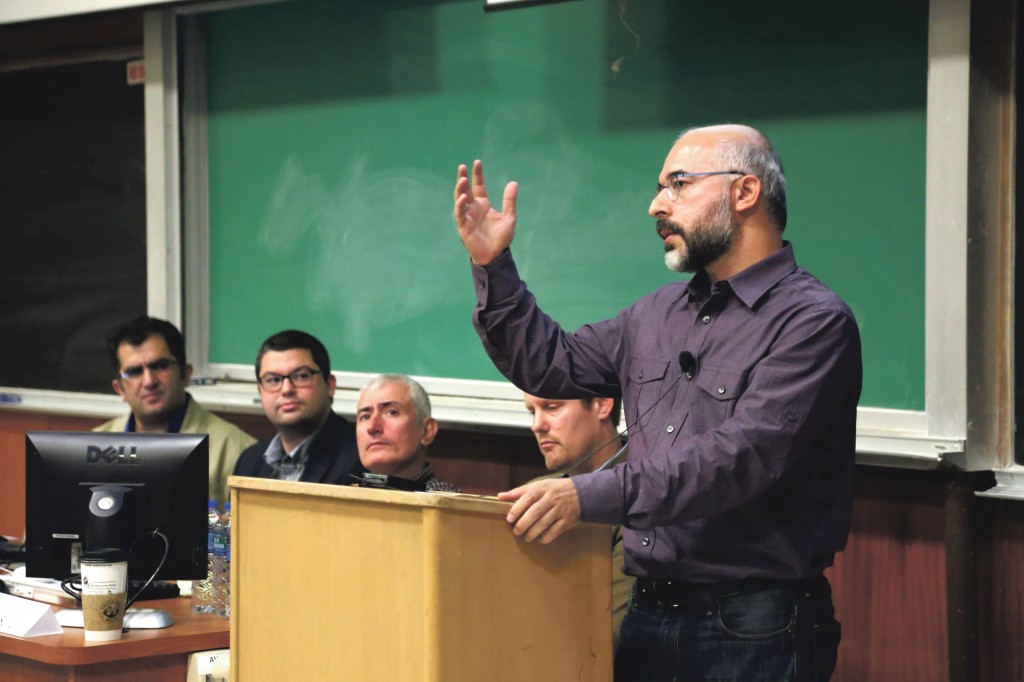
Following a tumultuous year of protest and political upheaval, five scholars gathered Thursday night to discuss and analyze the implications of popular uprising in Turkey.
Each panelist touched upon a particular political issue in Turkey, gathering before a crowd of about 60 in Science 1.
After being introduced by Ekrem Karakoc, an assistant professor of political science at Binghamton University, Sedat Bozkurt was first to speak on media and power relations in Turkey.
Bozkurt, a political journalist for the past 26 years who is currently a FOX-TV Ankara representative as a TV and newspaper correspondent, editor and manager, offered his opinions in Turkish. Translating for him was Dogan Eskinat, a political adviser at the Grand National Assembly of Turkey, who admitted that he was “not a professional” and parts of what Bozkurt said would be slightly lost in translation.
Political control over the media, something that is not a new phenomenon according to Bozkurt, is a situation in Turkey that creates tension between the general public and media outlets.
“People tend to have low expectation from the media in terms of solving their problems, and for this reason they direct harsh criticism towards the media outlets,” Bozkurt said.
Bozkurt went on to explain that news in media is often skewed, partially because of the type of capital that is behind the publishing operation.
“For instance, if your boss is running an energy business in addition to the media outlet, you would not reflect the ministry of energy in a bad way,” Bozkurt said.
Bozkurt broke down the unrealistic circulation of newspapers in Turkey.
“The total circulation of newspapers is 5-6 million. Out of this 5 or 6 millions, about 1.5 [million] issues are subscription services, another half million are just given away for free, another 1 million are sports papers, and another 1 million are tabloids, so you could say that real newspapers have a circulation of about 1 million,” Bozkurt said.
Bozkurt touched upon the current social uprising and Gezi Park protests in Turkey, as did Eskinat.
Formerly, Eskinat was a researcher at “The Foundation for Political, Economic and Social Research” (SETA), where he was part of a team that went to several protest sites throughout Turkey. During their project they conducted over 60 interviews with the protest participants.
“Our research questions fundamentally focused on the social and economic profile of participants because the main debate in media outlets in Turkey was how we would characterize the event,” Eskinat said.
According to Eskinat, the results of their sample showed that the majority of protesters were between ages 20 and 24. Additionally, 17.8 percent were between 25 and 29 years old, and 11 percent between 15 to 19 years old.
“Most of these kids have never been in a street demonstration before,” Eskinat said.
Kent Schull, an associate professor of history, spoke from an “insider-outsider” perspective.
Schull lived with his family in Turkey for two years, his youngest child being born there. His anecdotes came from witnessing protests first hand.
The progress that Kurds in Turkey are making in facing denial of equal recognition can be broken into three stages according to Mucahit Bilici, assistant professor of sociology at John Jay College, CUNY and columnist for the Turkish Daily, Taraf.
“In the past, there was reaction and fury,” Bilici said, marked by the unheard voices of the people. “Today, we have entered the stage of conversation. They are learning ways to articulate their differences …the third stage, this transition will take maybe five, ten years … is when the Kurds have gained equality by challenging the public spirit in presence of reason.”


